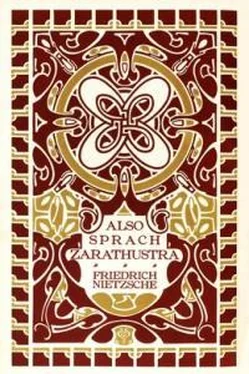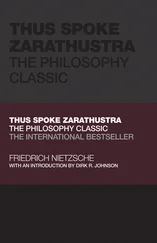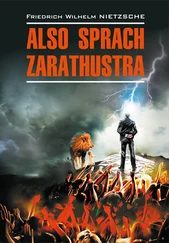—Because ye at last did again as children do—namely, prayed, folded your hands and said 'good God'!
But now leave, I pray you, THIS nursery, mine own cave, where to–day all childishness is carried on. Cool down, here outside, your hot child–wantonness and heart–tumult!
To be sure: except ye become as little children ye shall not enter into THAT kingdom of heaven." (And Zarathustra pointed aloft with his hands.)
"But we do not at all want to enter into the kingdom of heaven: we have become men,—SO WE WANT THE KINGDOM OF EARTH."
3.
And once more began Zarathustra to speak. "O my new friends," said he,— "ye strange ones, ye higher men, how well do ye now please me,—
—Since ye have again become joyful! Ye have, verily, all blossomed forth: it seemeth to me that for such flowers as you, NEW FESTIVALS are required.
—A little valiant nonsense, some divine service and ass–festival, some old joyful Zarathustra fool, some blusterer to blow your souls bright.
Forget not this night and this ass–festival, ye higher men! THAT did ye devise when with me, that do I take as a good omen,—such things only the convalescents devise!
And should ye celebrate it again, this ass–festival, do it from love to yourselves, do it also from love to me! And in remembrance of me!"
Thus spake Zarathustra.
1.
Meanwhile one after another had gone out into the open air, and into the cool, thoughtful night; Zarathustra himself, however, led the ugliest man by the hand, that he might show him his night–world, and the great round moon, and the silvery water–falls near his cave. There they at last stood still beside one another; all of them old people, but with comforted, brave hearts, and astonished in themselves that it was so well with them on earth; the mystery of the night, however, came nigher and nigher to their hearts. And anew Zarathustra thought to himself: "Oh, how well do they now please me, these higher men!"—but he did not say it aloud, for he respected their happiness and their silence.—
Then, however, there happened that which in this astonishing long day was most astonishing: the ugliest man began once more and for the last time to gurgle and snort, and when he had at length found expression, behold! there sprang a question plump and plain out of his mouth, a good, deep, clear question, which moved the hearts of all who listened to him.
"My friends, all of you," said the ugliest man, "what think ye? For the sake of this day— I am for the first time content to have lived mine entire life.
And that I testify so much is still not enough for me. It is worth while living on the earth: one day, one festival with Zarathustra, hath taught me to love the earth.
'Was THAT—life?' will I say unto death. 'Well! Once more!'
My friends, what think ye? Will ye not, like me, say unto death: 'Was THAT—life? For the sake of Zarathustra, well! Once more!'"—
Thus spake the ugliest man; it was not, however, far from midnight. And what took place then, think ye? As soon as the higher men heard his question, they became all at once conscious of their transformation and convalescence, and of him who was the cause thereof: then did they rush up to Zarathustra, thanking, honouring, caressing him, and kissing his hands, each in his own peculiar way; so that some laughed and some wept. The old soothsayer, however, danced with delight; and though he was then, as some narrators suppose, full of sweet wine, he was certainly still fuller of sweet life, and had renounced all weariness. There are even those who narrate that the ass then danced: for not in vain had the ugliest man previously given it wine to drink. That may be the case, or it may be otherwise; and if in truth the ass did not dance that evening, there nevertheless happened then greater and rarer wonders than the dancing of an ass would have been. In short, as the proverb of Zarathustra saith: "What doth it matter!"
2.
When, however, this took place with the ugliest man, Zarathustra stood there like one drunken: his glance dulled, his tongue faltered and his feet staggered. And who could divine what thoughts then passed through Zarathustra's soul? Apparently, however, his spirit retreated and fled in advance and was in remote distances, and as it were "wandering on high mountain–ridges," as it standeth written, "'twixt two seas,
—Wandering 'twixt the past and the future as a heavy cloud." Gradually, however, while the higher men held him in their arms, he came back to himself a little, and resisted with his hands the crowd of the honouring and caring ones; but he did not speak. All at once, however, he turned his head quickly, for he seemed to hear something: then laid he his finger on his mouth and said: "COME!"
And immediately it became still and mysterious round about; from the depth however there came up slowly the sound of a clock–bell. Zarathustra listened thereto, like the higher men; then, however, laid he his finger on his mouth the second time, and said again: "COME! COME! IT IS GETTING ON TO MIDNIGHT!"—and his voice had changed. But still he had not moved from the spot. Then it became yet stiller and more mysterious, and everything hearkened, even the ass, and Zarathustra's noble animals, the eagle and the serpent,—likewise the cave of Zarathustra and the big cool moon, and the night itself. Zarathustra, however, laid his hand upon his mouth for the third time, and said:
COME! COME! COME! LET US NOW WANDER! IT IS THE HOUR: LET US WANDER INTO THE NIGHT!
3.
Ye higher men, it is getting on to midnight: then will I say something into your ears, as that old clock–bell saith it into mine ear,—
—As mysteriously, as frightfully, and as cordially as that midnight clock–bell speaketh it to me, which hath experienced more than one man:
—Which hath already counted the smarting throbbings of your fathers' hearts—ah! ah! how it sigheth! how it laugheth in its dream! the old, deep, deep midnight!
Hush! Hush! Then is there many a thing heard which may not be heard by day; now however, in the cool air, when even all the tumult of your hearts hath become still,—
—Now doth it speak, now is it heard, now doth it steal into overwakeful, nocturnal souls: ah! ah! how the midnight sigheth! how it laugheth in its dream!
—Hearest thou not how it mysteriously, frightfully, and cordially speaketh unto THEE, the old deep, deep midnight?
O MAN, TAKE HEED!
4.
Woe to me! Whither hath time gone? Have I not sunk into deep wells? The world sleepeth—
Ah! Ah! The dog howleth, the moon shineth. Rather will I die, rather will I die, than say unto you what my midnight–heart now thinketh.
Already have I died. It is all over. Spider, why spinnest thou around me? Wilt thou have blood? Ah! Ah! The dew falleth, the hour cometh—
—The hour in which I frost and freeze, which asketh and asketh and asketh: "Who hath sufficient courage for it?
—Who is to be master of the world? Who is going to say: THUS shall ye flow, ye great and small streams!"
—The hour approacheth: O man, thou higher man, take heed! this talk is for fine ears, for thine ears—WHAT SAITH DEEP MIDNIGHT'S VOICE INDEED?
5.
It carrieth me away, my soul danceth. Day's–work! Day's–work! Who is to be master of the world?
The moon is cool, the wind is still. Ah! Ah! Have ye already flown high enough? Ye have danced: a leg, nevertheless, is not a wing.
Ye good dancers, now is all delight over: wine hath become lees, every cup hath become brittle, the sepulchres mutter.
Ye have not flown high enough: now do the sepulchres mutter: "Free the dead! Why is it so long night? Doth not the moon make us drunken?"
Читать дальше











